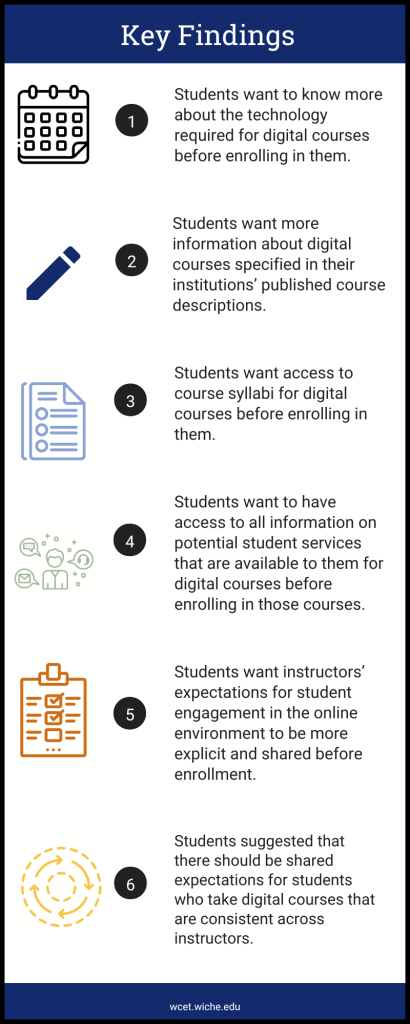Helping Students Prepare for Digital Learning: Providing Information at the Time of Enrollment
Published by: WCET | 12/13/2022
Tags: Digital Learning, Distance Education, Managing Digital Learning, Online Learning, Student Success
Published by: WCET | 12/13/2022
Tags: Digital Learning, Distance Education, Managing Digital Learning, Online Learning, Student Success
As digital learning professionals, we know that there are a variety of issues that can factor into student success in a digital course. Such issues range from access to the necessary technologies and bandwidth to better understanding instructor expectations for virtual (and in the case of hybrid) student engagement. In order to make the best decisions possible, students need an abundance of information about their digital courses prior to registration. Yet much of the information about a digital learning course outside of whether or not it is online or hybrid may be unknown to students at the time of registration. During 2022, WCET, in collaboration with the Canadian Digital Learning Research Association (CDLRA) and Bay View Analytics, conducted research on the definitions of digital learning. In an attempt to better understand how we can best help students make sure that enrollment in digital learning will best work for them, WCET and The Ohio State University’s Office of Technology and Digital Innovation collaborated on a student focus group to better understand what information students believe is most critical to know when making decisions about enrolling in digital learning courses.
As a part of research on the definitions of digital learning conducted by WCET, CDLRA, and Bay View Analytics, WCET and The Ohio State University’s Office of Technology and Digital Innovation talked with six students to learn what information they want to know before enrolling in a digital course. The focus group consisted of six institutions evenly split between community colleges and universities from California, Colorado, Connecticut, Florida, North Carolina, and Wyoming. Four students were enrolled in baccalaureate degree programs, one in an associate’s degree program, and one in a master’s degree program. Four of the students were taking courses partially online and two students were fully online. Additionally, four were adult students while two were traditionally aged students. Finally, two students identified as Black, one as White, one as Latino/x, and two did not identify.
The focus group took place via Zoom on June 21, 2022, and used questions co-developed by WCET and The Ohio State University staff. The Ohio State University staff then analyzed the recording to identify common themes and six key findings.

Students want to know more about the technology required for digital courses before enrolling in them.
Students are especially interested in better understanding the devices and software they will need for the course in addition to the estimated cost of that technology. As one student put it, “It would really help not set up for failure… thinking that we’re getting to get this done, and then we don’t realize that we don’t have the means or the capability. So it’s just helping to not set ourselves up for failure.”
Students want more information about digital courses specified in their institutions’ published course descriptions.
Course description often do not include critical digital learning information such as the technology required for the course, expectations around student engagement, and any additional costs, especially those related to required or recommended devices and software. Students need to understand both what technologies will be used and whether or not their devices are compatible with those technologies. As one student explained, “I was able to log into the virtual labs with a Chromebook. However, it was a lot harder than if I was to actually log into my desktop that has more graphics power…”
Students want access to course syllabi for digital courses before enrolling in them.
Students want to better understand the requirements related to the digital components of a digital and their costs course prior to enrollment. This might include information such as whether the course will be synchronous or asynchronous, the number of face-to-face sessions for hybrid courses, technology requirements for the course, and whether or not course materials are open-sourced. Students are also interested in better understanding the bandwidth that will be required for the course. Without such information, as one student put it: “[Y]ou’re basically blind registering for the class prior to knowing that information. You don’t get that until we are in our syllabus once you’re already registered for the course.”
Students want to have access to all information on potential student services that are available to them for digital courses before enrolling in those courses.
Students enrolled in digital courses are interested in better understanding what sort of services will be available to them. These services might include financial aid assistance, tutoring services, technical assistance, and any orientations related to the digital course. By providing this information to students both on the institution’s website and on the course syllabi, institutions can ensure student access to services vital to their success in digital courses.
Students want instructors’ expectations for student engagement in the online environment to be more explicit and shared before enrollment.
Students want to better understand instructors’ expectations around student engagement in their digital courses. This might include policies on remote proctoring, expectations around appearing on screen during synchronous digital sessions, virtual attendance policies, and policies associated with online forums.
Students suggested that there should be shared expectations for students who take digital courses that are consistent across instructors.
Students enrolled in multiple digital courses reported that instructor expectations regarding student engagement varied significantly. Some instructors might require synchronous engagement while others expected asynchronous engagement. Students expressed a desire for more uniformed expectations across faculty.

The most crucial take away from this research is understanding the strong desire that students have to know much more information about digital learning courses prior to enrollment. Not only did students identify a desire to know technology needs for the class early, but they also identified a desire to better understand instructors’ expectations.
It’s clear that prior to enrolling in digital learning experiences, students want to make sure that they are set up for success. Students also expressed a desire to understand how to access course materials, especially whether or not materials are open source and/or digital, and the institutional support that will be available to them as a digital learning student.
Although much of this information may be listed in the course syllabus, access to syllabi is likely not available after registration and often not until the first day of the course. Making syllabi available prior to registration, or at least making key information on necessary technologies their potential costs and information on support services for digital learners, can be a critical first step in setting students up for success in their digital learning courses.
For more information on our joint survey with the Canadian Distance Learning Research Association and Bayview Analytics, please visit our Digital Learning Definitions web page which includes a link to a scholarly article in Online Learning: The Official Journal of OLC, an executive summary of the research, and infographics on the distance learning definitions. Stay tuned for more analysis of this research, including a discussion of the various federal definitions of distance education in 2023.